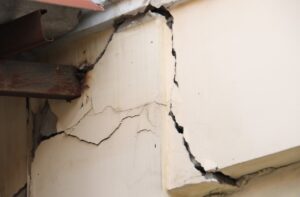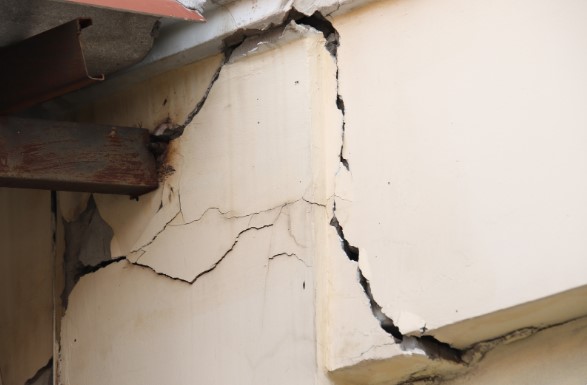 When you’re walking around your house, have you noticed small cracks in walls or ceilings recently? While these harmless crevices may not seem like a big deal at first glance, they can be an early indication of a more serious structural issue. Before the problem gets any bigger, it’s important for homeowners to take proactive steps and understand how to protect their homes from potential damage to its foundation due to badly maintained foundations. In this blog post, we’ll explain why it’s essential for you as a homeowner to be aware of small signs of damage that could signal trouble down the road. Read on for advice on how best to safeguard your house from potentially costly repairs!
When you’re walking around your house, have you noticed small cracks in walls or ceilings recently? While these harmless crevices may not seem like a big deal at first glance, they can be an early indication of a more serious structural issue. Before the problem gets any bigger, it’s important for homeowners to take proactive steps and understand how to protect their homes from potential damage to its foundation due to badly maintained foundations. In this blog post, we’ll explain why it’s essential for you as a homeowner to be aware of small signs of damage that could signal trouble down the road. Read on for advice on how best to safeguard your house from potentially costly repairs!
Different types of foundation cracks
A crack in the foundation of your home might seem like a small issue, but it can lead to bigger problems if not addressed promptly. There are several types of foundation cracks, each with its potential consequences. Vertical cracks are the most common and can be a result of house settling or changes in temperature. Horizontal cracks, on the other hand, can indicate major structural problems and require immediate attention. Diagonal cracks can suggest a foundation that is sinking, and stair-step cracks can signal serious damage to the foundation. It’s crucial to understand the type of crack and its potential consequences to determine the best course of action for your home’s foundation.
Identify the causes of the cracks
While cracks in your home or property can be concerning, it’s important to identify the cause of the cracks to determine the severity of the situation. Some cracks may be a minor issues caused by natural settling, while others may indicate a serious structural problem. It’s essential to seek the advice of a professional who can assess the situation and provide you with the necessary information to take action. Don’t ignore the problem and hope it goes away on its own. Be proactive and address the issue before it becomes more significant and potentially costly. Proper identification of the cause of the cracks can provide peace of mind and allow you to take the necessary steps to ensure the safety and structural integrity of your property.
Signs of a structural foundation issue
Your home’s foundation is the backbone of your house, and it’s crucial to ensure it’s strong and stable. Foundation issues are not always apparent, which is why it’s essential to learn the signs of a structural foundation problem. Some common signs to watch for include cracks in the walls or ceilings, uneven floors, doors or windows that won’t close properly and pooling water around the foundation. These indicators may seem small, but they can signal significant foundation problems. By recognizing the warning signs early on, you can take steps to address any potential issues before they become more extensive and more expensive to repair. Don’t neglect the importance of your home’s foundation – stay alert for any signs of trouble and take swift action for peace of mind.
How to prevent further damage
When disaster strikes, the first priority is always to mitigate the damage. But what about preventing further harm? Whether it’s a natural disaster like a hurricane or a fire in your home, there are steps you can take to ensure that the damage doesn’t spread. One important aspect of prevention is identifying potential hazards.
If you’re dealing with a flood, for example, make sure you turn off the electricity and gas in your home to prevent electrocution and gas leaks. Another key factor is acting quickly. The longer you wait to address the damage, the more likely it is to worsen. With a clear plan in place, you can minimize the effects of a disaster and prevent further damage.
Decide if you need professional help
When it comes to repairing something, it can be tempting to dive right in and tackle the issue on your own. But sometimes, the problem may require a bit more expertise and knowledge than you possess. Deciding whether or not to seek out professional help can be a tough call, but it’s an important one to make.
If you’re unsure of your abilities or you’re dealing with a complicated issue, it’s always better to err on the side of caution and enlist the help of a pro like this one www.levelprofoundationrepair.com. They’ll be able to diagnose the issue accurately and provide a solution that will keep your item functioning properly for years to come.
On the other hand, if you have the skills and knowledge necessary to handle the job, there’s no harm in giving it a shot yourself. Just make sure you’re being safe and taking all the necessary precautions before getting started.
Take action to safeguard your house foundation and prevent further damages
A house foundation is one of the most important parts of any home. It is the backbone that supports the entire structure. Unfortunately, many homeowners neglect the foundation until there is already significant damage. However, taking action to safeguard your foundation and prevent further damage is critical to the longevity of your home.
Simple measures like checking for cracks regularly, ensuring proper drainage, and monitoring the moisture levels around your home can go a long way in preventing costly repairs. Don’t wait until it’s too late to take care of your foundation. Start protecting it now and enjoy the peace of mind that your home is safe and secure.
While understanding the basics of foundation cracks and how to identify them is important, it can be intimidating to know where to start. If your house is exhibiting any signs of foundation issues or if you just want peace of mind, experts are available to provide guidance. A professional inspection can provide an accurate assessment of the health of your foundation and recommend a repair strategy that’s tailored to your particular situation. Additionally, ensuring proper drainage, addressing nearby landscaping problems, and creating an up-to-date maintenance plan are surefire ways to protect and prolong the life of your foundation. Addressing any issues quickly is key in preventing further damage down the line—the earlier you address your concerns, the safer you will be!
